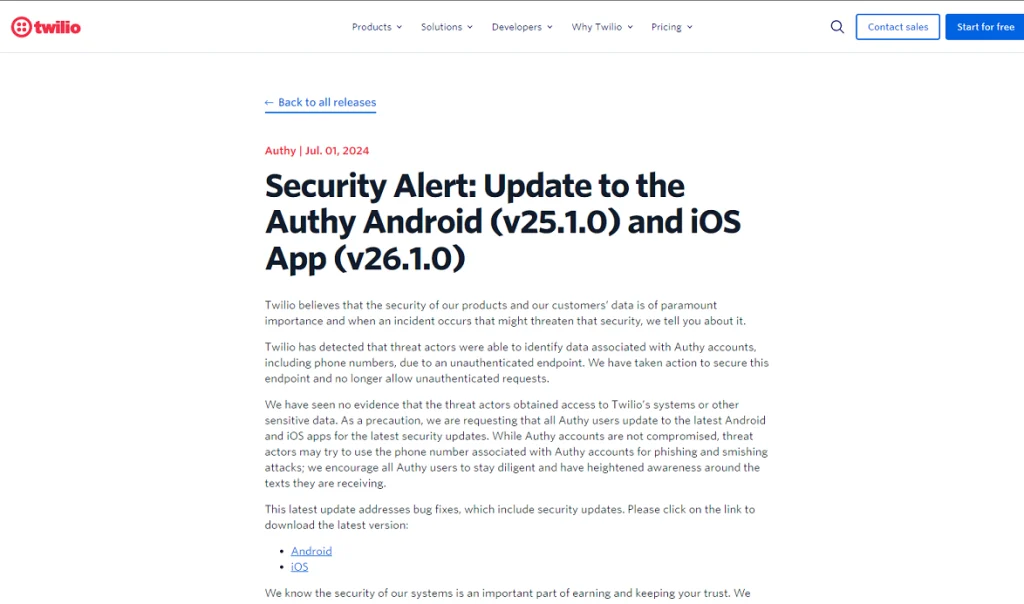On July 1, a significant security breach targeted the database of the Authy Android app, as reported by Twilio, the app’s developer. The breach enabled unauthorized access, allowing hackers to extract data related to user accounts, particularly phone numbers.
Authy’s Role in Security Protocols
Although Twilio assured that the authentication credentials remained secure—stating the accounts themselves “are not compromised”—the exposure of phone numbers raises concerns over potential phishing and smishing attacks.
As a precaution, Twilio has urged Authy users to maintain a heightened awareness concerning any suspicious text messages they might receive.Authy serves a critical role in the security protocols of centralized exchange users, where it is employed extensively for two-factor authentication (2FA).

This system enhances security by generating a temporary code on the user’s device, which must be provided to the exchange to authorize withdrawals, transfers, or other sensitive operations. Prominent exchanges such as Gemini and Crypto.com rely on Authy as their primary 2FA mechanism.
Additionally, other major platforms like Coinbase and Binance also support Authy as a 2FA option, underlining its widespread adoption.
The breach occurred through an unauthenticated endpoint, a security lapse promptly addressed by Twilio. The company has since fortified this endpoint, ensuring that it no longer accepts unauthenticated requests.
Users are encouraged to upgrade to the latest version of the app, which includes updated security features designed to prevent similar breaches.
Twilio has confirmed that the integrity of users’ authenticator codes has not been compromised. This assurance is crucial as it means that, despite the breach, attackers should not be able to gain unauthorized access to users’ exchange accounts.
Twilio emphasized, “We have seen no evidence that the threat actors obtained access to Twilio’s systems or other sensitive data,” suggesting that the breach was effectively contained to the exposure of phone numbers.
Further details emerged linking the attack to the ShinyHunters cybercriminal group. According to a report by Seeking Alpha, ShinyHunters were responsible for leaking a text file which purportedly contained the 33 million phone numbers registered with Authy.
This group is notorious within cybersecurity circles, having previously orchestrated a massive data breach at AT&T in 2021. That incident, as documented by the cybersecurity blog Restoreprivacy, compromised the data of 51 million customers, marking it as one of the significant breaches of that year.
Threat of SIM Swap Attacks
Authenticator apps like Authy were developed primarily to safeguard against SIM swap attacks—a prevalent method of social engineering. In these attacks, criminals convince phone companies to transfer a user’s phone number to a device under their control.
Once the number is hijacked, the attacker can intercept 2FA codes sent via SMS, gaining unauthorized access to the victim’s sensitive accounts. This method remains a significant threat, especially for users who still receive their 2FA codes through text messages rather than through more secure app-based systems.
A recent incident highlighted by blockchain security firm SlowMist revealed that users of the OKX exchange had suffered considerable financial losses due to SIM swap attacks, underscoring the ongoing risks associated with SMS-based 2FA.
The breach into Authy’s database underscores the persistent vulnerabilities in digital security systems and the continuous need for users and companies to remain vigilant and proactive in protecting personal and financial information in an increasingly interconnected digital landscape.
- Bitcoin Falls to $65K as Mt. Gox Transfers $2.8 Billion BTC to External Wallet
- News of Marathon Digital’s $138 Million Fine for Breach of Non-Disclosure Agreement Triggers a Bearish 2.5% of Its MARA Stock
- Are $530M Bitcoin ETF Inflows a Blessing or Caution?
- Metaplanet Teams with Hoseki for Real-Time Bitcoin Holdings Verification
- 10 Best Meme Coins To Invest in 2024
- Building Secure Blockchain Systems: An Exclusive Interview with ARPA and Bella Protocol CEO Felix Xu
- Building The “De-Facto Crypto Trading Terminal”: An Exclusive Interview with Aurox CEO Giorgi Khazaradze
- Building a New Global Financial System: An Exclusive Interview With Tyler Wallace, Analytics Head at TrustToken
- “Solana is the Promised Land for Blockchain” — An Exclusive Interview with Solend Founder Rooter
- El Salvador: Where The Bitcoin Revolution Begins With A Legal Tender

 Why Trust Us
Why Trust Us







